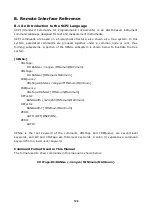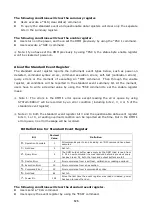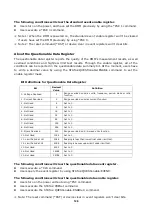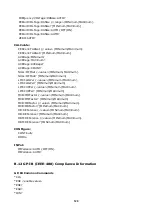
119
CALCulate:DB:REFerence? [MINimum|MAXimum]
Query the dB relative value.
CALCulate:DBM:REFerence {<value>|MINimum|MAXimum}
Set the dBm reference value. Choose from: 50 ~ 8000 ohms.
CALCulate:DBM:REFerence? [MINimum|MAXimium]
Query the dBm reference value.
DATA:FEED RDG_STORE,{“CALCulate”|””}
Selects whether readings taken using the INITiate command are stored in the multimeter’s
internal memory (default) or not stored at all. In the default state (DATA:FEED
RDG_STORE,“CALC”), up to
2000 readings are stored in memory when INITiate is executed.
The MEASure? And CONFigure commands automatically select “CALC”. With memory disabled
(DATA:FEED RDG_STORE,“”), rea
dings taken using INITiate are not stored. This may be useful
with the Min/Max operation since it allows you to determine an average of the readings without
storing the individual values. An error will be generated if you attempt to transfer readings to
the output buffer using the FETCh? command.
DATA:FEED?
Query the reading memory state. Return “CALC” or “”.
B.7 The Triggering Commands
INITiate
Change the state of the triggering system from the “idle” state to “wait
-for-
trigger” state. The
meter will start to make measurements when a required triggering condition is met after the
INITiate command is received. Readings are stored in memory until you are ready to read
them. Use FETCh? command to retrieve your measurements results.
READ?
Change the state
of the triggering system from the “idle” state to “wait
-for-
trigger” state. The
meter will start to make measurements when a required triggering condition is met after the
READ? Command is received. Readings are sent to the output buffer right away.
TRIGger:SOURce {BUS|IMMediate|EXTernal}
Select a trigger source. The multimeter will accept a software (BUS) trigger, an immediate
internal trigger, or a hardware trigger from the rear-panel EXT TRIG terminal.
TRIGger:SOURce?
Query the trigger source.
















































